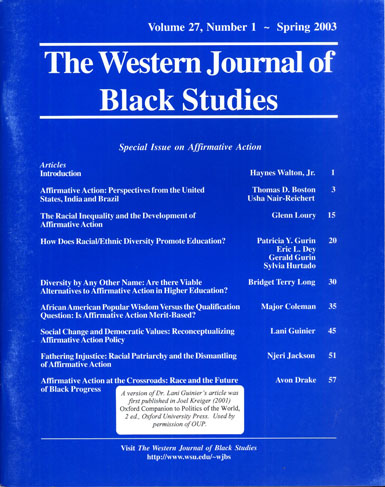Volume 27, Issue 1
Affirmative Action: Perspectives for the United States, India and Brazil
Thomas D. Boston, Usha Nair-Reichert
The United States, India and Brazil are facing Supreme Court challenges to the implementation of affirmative action programs. While their histories of racial and caste oppression differ, the challenges to implementing affirmative action confronting each country are remarkably similar. The paper concludes that if affirmative action policies are to be effective, they must be backed by constitutional provisions that recognize those policies as restitution fo rpast racial or caste injustices and a political party that is committed to their implementation.
pp. 3-14
Racial Inequality and Development of Affirmative Action
Glenn C. Loury
The need so reduce racial inequality in America is something Ifully support. However this should not be equated with support of a quota system. But I do defend initiatives like the U.S. Army's programs to commission more black officers, the public funding
of efforts to bring blacks into science and engineering, and the goal of top universities to retain some racial diversity in their student bodies. This paper pursues these concerns as a way of illuminating how policies can be developed to enhance racial diversity. It does not support an unqualified defense of the affirmative action status quo.
pp.
15-19
How Does Racial/Ethical Diversity Promote Education?
Patricia Y. Gurin, Eric L. Dey, Gerald Gurin, Sylvia Hurtado
Educators have been challenged to articulate clearly the educational purposes and benefits of diversity in the context of legal challenges related to affirmative action policies. This article explores the relationship between students' experiences with diverse peers in collegiate settings and their educational outcomes, and discusses this in the context of lawsuits brought against the University of Michigan.
pp. 20-29
Diversity by Any Other Name: Are There Viable Alternatives to Affirmative Action in HIgher Education?
Bridget Terry Long
As the debate continues about affirmative action in higher education, one major question is whether or not there are alternatives to racial preferences that would maintain levels of diversity in higher education. This paper will explore this issue by examining several alternatives that have been considered in recent years. Percentage plans have not been able to produce levels of racial and ethnic diversity in higher education that reach previous levels, and the most successful colleges have combined the policy with aggressive recruiting efforts. Other alternatives such as changes to admissions tests and standards are also discussed.
pp. 30-34
African American Popular Wisdom Versus the Qualification Question:
Is Affirmative Action Merit-Based?
Major Coleman
There are two clashing beliefs about affirmative action: one is that affirmative action is a system of racial preferences that discriminates against innocent whites and results in the employment of unqualified or less qualified blacks and Latinos; the other is that affirmative action is merit-based and that blacks and Latinos must be better qualified than whites just to have the same education or job. College admission test scores and academic grades seem to be the most discussed way of assessing merit. However since the education market feeds into the much larger labor market, the labor market is the place to look for outcomes. And labor market
outcomes provide no evidence that an explicit policy of affirmative action in education or hiring results in the employment of blacks who are less able than white workers. Rather, given similar socioeconomic backgrounds, it is white workers and students who are more likely to be less qualified by education and actual on-the-job experience.
pp. 35-44
Social Change and Democratic Values:
Reconceptualizing Affirmative Action Policy
Lani Guinier
The current debate over affirmative action continues the tradition of focusing on quantifiable measurements and merit as the criteria for the distribution of benefits, i.e., university admission seats. This paper joins the current discourse on affirmative
action by suggesting that we move beyond the present polarized debate by illuminating how the concepts of merit and fairness might be more meaningfully explored in a democratic society. Introducing what I tentatively call a process of confirmative action, this paper urges the establishment of policies that link all admission practices to the broad purposes and public character of higher education in a multiracial democracy.
pp. 45-50
Fathering Injustice: Racial Patriarchy and Dismantling of Affirmative Action
Njeri Jackson
This essay explores the tension between struggles for racial and gender equality. The author argues that white males have often pitted white women against African Americans and African American males against gender equality in attempts to dilute the impact of struggles for racial and gender equality and to maintain white male patriarchal privilege.
pp. 51-56
Affirmative Action at the Crossroads:
Race and the Future of Black Progress
Avon Drake
Affirmative action continues to be a contentious public policy issue in American life and politics. Currently, as it relates to blacks and other minorities, affirmative action is under increasing attack. To cushion the effects of this, blacks need to pursue a parallel strategy of exogenous and indigenous methods of group empowerment. Political values of black self-reliance, strong racial unity, and the imperative of wealth accumulation are essential for continued group progress
pp. 57-64

| The WJBS site is normally maintained by Tanya Gonzales. Please feel free to e-mail comments, queries, and suggestions. |
Heading using the h3 tag
Lorem ipsum dolor sit amet, consectetur adipisicing elit, sed do eiusmod tempor incididunt ut labore et dolore magna aliqua. Ut enim ad minim veniam, quis nostrud exercitation ullamco laboris nisi ut aliquip ex ea commodo consequat. Duis aute irure dolor in reprehenderit in voluptate velit esse cillum dolore eu fugiat nulla pariatur. Excepteur sint occaecat cupidatat non proident, sunt in culpa qui officia deserunt mollit anim id est laborum.